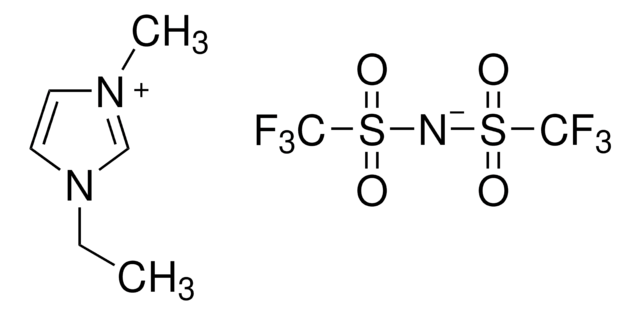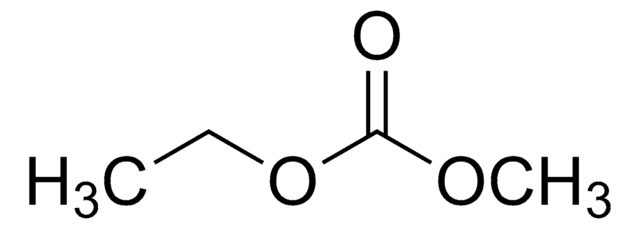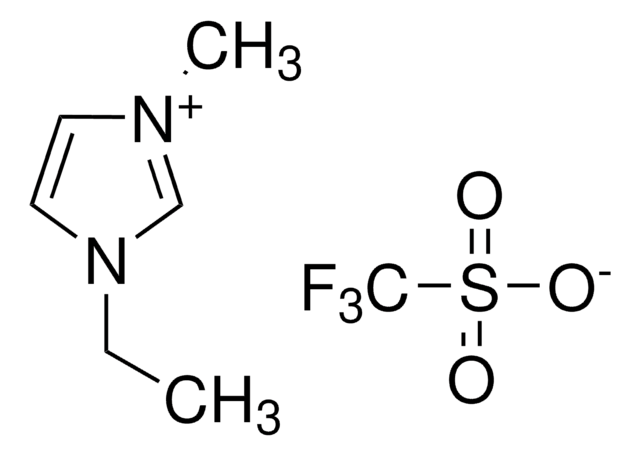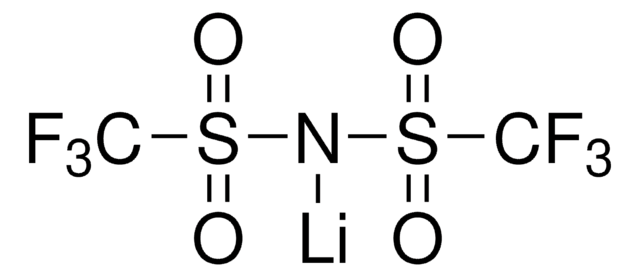900813
1-Ethyl-1-methylpyrrolidinium bis(trifluoromethylsulfonyl)imide
≥99%, H2O <500 ppm
Synonym(s):
N-Ethyl-N-methylpyrrolidinium bis(trifluoromethanesulfonyl)amide, N-Ethyl-N-methylpyrrolidinium bis(trifluoromethanesulfonyl)imide, N-Ethyl-N-methylpyrrolidinium bis(trifluoromethylsulfonyl)imid, Methylethylpyrrolidinium bis(trifluoromethylsulfonyl)imide
About This Item
Recommended Products
Quality Level
Assay
≥99%
form
powder
composition
H2O, <500 ppm
impurities
≤500 ppm H2O
mp
89-91 °C
application(s)
battery manufacturing
SMILES string
CC[N+]1(C)CCCC1.FC(F)(F)S(=O)(=O)[N-]S(=O)(=O)C(F)(F)F
InChI
1S/C7H16N.C2F6NO4S2/c1-3-8(2)6-4-5-7-8;3-1(4,5)14(10,11)9-15(12,13)2(6,7)8/h3-7H2,1-2H3;/q+1;-1
InChI key
BRVHCCPVIILNPA-UHFFFAOYSA-N
Looking for similar products? Visit Product Comparison Guide
Related Categories
General description
Application
related product
Signal Word
Danger
Hazard Statements
Precautionary Statements
Hazard Classifications
Acute Tox. 3 Dermal - Acute Tox. 3 Oral - Aquatic Chronic 2 - Eye Dam. 1 - Skin Corr. 1B
Storage Class Code
6.1A - Combustible acute toxic Cat. 1 and 2 / very toxic hazardous materials
WGK
WGK 3
Flash Point(F)
Not applicable
Flash Point(C)
Not applicable
Choose from one of the most recent versions:
Certificates of Analysis (COA)
Don't see the Right Version?
If you require a particular version, you can look up a specific certificate by the Lot or Batch number.
Already Own This Product?
Find documentation for the products that you have recently purchased in the Document Library.
Articles
Dr. Sun reviews the recent advances in solid-state rechargeable batteries and cover the fundamentals of solid electrolytes in solid-state batteries, the theory of ion conduction, and the structures and electrochemical processes of solid-state Li batteries.
Here, we present a short review of ionic liquid electrolytes used in state-of-the-art rechargeable batteries including high performance and low-cost aluminum batteries, non-flammable Li-based batteries, and high-cycling and stable dual-graphite batteries. We also outline the key issues explored so as to identify the future direction of IL development.
Our team of scientists has experience in all areas of research including Life Science, Material Science, Chemical Synthesis, Chromatography, Analytical and many others.
Contact Technical Service










